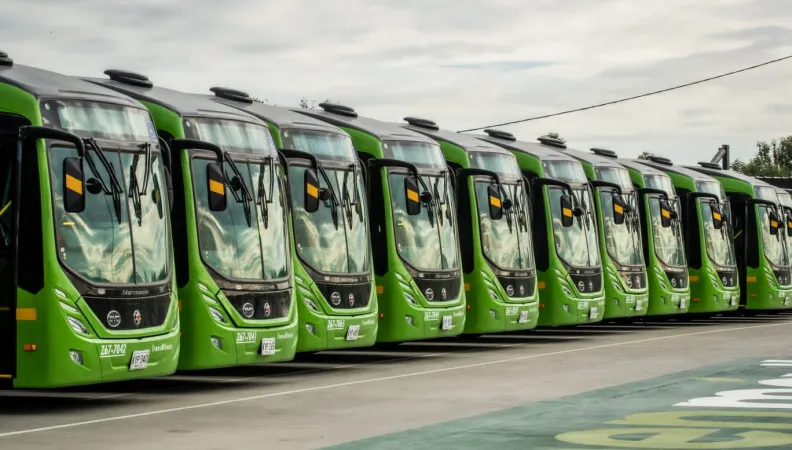Share the page
With Green Móvil, Proparco is supporting the electrification of buses in Colombia
Published on

One year after the Electribus project, Proparco is renewing its support for clean mobility in Colombia with Green Móvil. Financed in partnership with the Colombian development bank FDN, the operation will allow the city of Bogota to acquire 406 electric buses and the infrastructure required for them to run properly.
Details and analysis from Johann Choux, Regional Director for Colombia and the Andean Region, and Luis Andres Alandia, Senior Investment Officer at Proparco.
Proparco is cofinancing the Green Móvil e-mobility project with Financiera de Desarrollo Nacional (FDN). What are the main issues for this project?
Johann Choux (Regional Director for Colombia and the Andean Region): One of the first issues for the Green Móvil project was to offer a financing solution tailored to our client’s needs in a very short timeframe.
We were able to capitalize on our experience in financing electric buses in Bogota after having financed the acquisition of 259 buses at Electribus in 2021 with our partner, the Colombian development bank FDN. It helped us finalize the operation very quickly. With the increase in interest rates, we also had to offer competitive financing to ensure the financial balance of the project was sustainable.
Luis Andres Alandia (Senior Investment Officer): Bogota is one of the biggest cities in Latin America and the Caribbean. Every month, over 100 million journeys are made there using public means of transport, almost exclusively buses. Providing a high-quality public transport service, while reducing the carbon footprint, is both necessary and complex.
The Green Móvil project is making a real contribution to mitigating climate change (the buses run 100% on renewable energies) and improving air quality. All the buses are wheelchair-accessible. The parity criterion is fulfilled in the company’s management. Finally, we’re supporting a joint venture set up 20 years ago between a French world leader (Transdev) and a high-level local operator (Fanalca).
What are the expected impacts for the city of Bogota which, with 9 million inhabitants, is home to 20% of the country’s population?
Johann Choux: There are very many expected impacts. Bogota is one of the most congested cities in the world. I experience this first hand every day. There are huge distances to travel – almost 45 km from the north to the south – and travelling is complicated. For the residents of Bogota who use public transport in great numbers, it’s important to provide high-quality facilities such as the buses whose deployment we’ve financed. Improving air quality is obviously a crucial aspect of the project, as many of the buses on the secondary network on which the 406 buses financed by PROPARCO run are old and highly polluting. Our financing will not only reduce fine particle emissions, it will also avoid the emission of 23,500 tons of CO2 a year.
So, one year after the Electribus project signed in 2021, Proparco is stepping up its action in the urban transport sector in Colombia. What are Proparco’s investment objectives in this sector?
Luis Andres Alandia: Our status as lead investor for the Electribus project has undoubtedly been a decisive factor in our getting this second e-mobility mandate. We do, of course, want to continue to finance urban transport projects in the region (buses, metros, light rail and cable cars) and are actively working on identifying opportunities with the teams on the ground. We also still have the same ambition of continuing to be a key player in the transition towards electric mobility.
Two examples to illustrate this trend:
- In AFD Group, the E-motion program with the Green Climate Fund is under appraisal and should deploy over $300 million to support electric mobility in Latin America.
- At PROPARCO, we’re appraising our third electric bus project: the bus rapid transit (BRT) system in Dakar in Senegal which will be the very first electric BRT system in Africa.
How is the Green Móvil project contributing to the achievement of the Sustainable Development Goals (SDGs) in Colombia?
Luis Andres Alandia: C40, the Cities Climate Leadership Group, has highlighted two interesting facts. Firstly, cities account for 70% of global greenhouse gas emissions and a third of these emissions in large cities are caused by transport. Secondly, the rate of public transport use needs to double in the world’s cities to limit global warming to 1.5°C. In other words, e-mobility will be crucial for the achievement of carbon neutrality.
Bogota has been a pioneer in the transition towards e-mobility: by the end of 2022, it will be the city in Latin America and the Caribbean with the largest fleet of electric buses. A flagship project such as Green Móvil will contribute to mitigating climate change and limiting other air pollutants, while providing a high-quality service for over 36 million passengers a year. The project thereby contributes to the achievement of SDGs #9 (Industry, innovation and infrastructure), #11 (Sustainable cities and communities) and #13 (Climate action).
Johann Choux: This project is fully in line with the city of Bogota’s 2020-2024 Development Plan, which makes the SDGs central to the city’s ambitions. This plan comprises five strategic objectives, which include climate change adaptation and mitigation and the transformation of Bogota into a model for urban mobility. By providing the residents of the Colombian capital with modern and clean means of transport, operated by an experienced manager like Transdev-Fanalca, we aim to fully contribute to the achievement of these objectives.
--------------------------------------------------------------------------------------------------------------------------------------------------------
Electribus project in Colombia with Green Móvil
Video: Presentation of Green Móvil
--------------------------------------------------------------------------------------------------------------------------------------------------------
